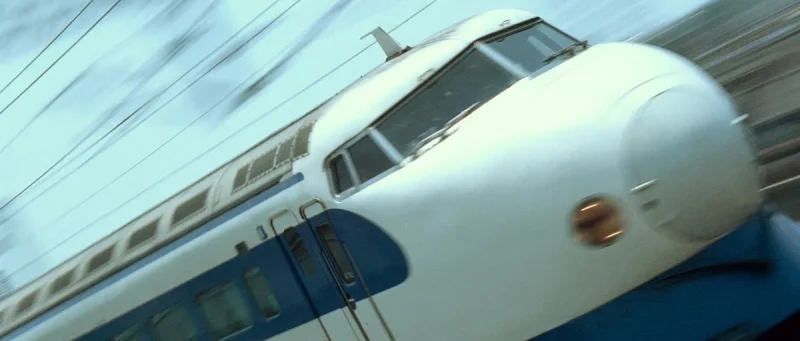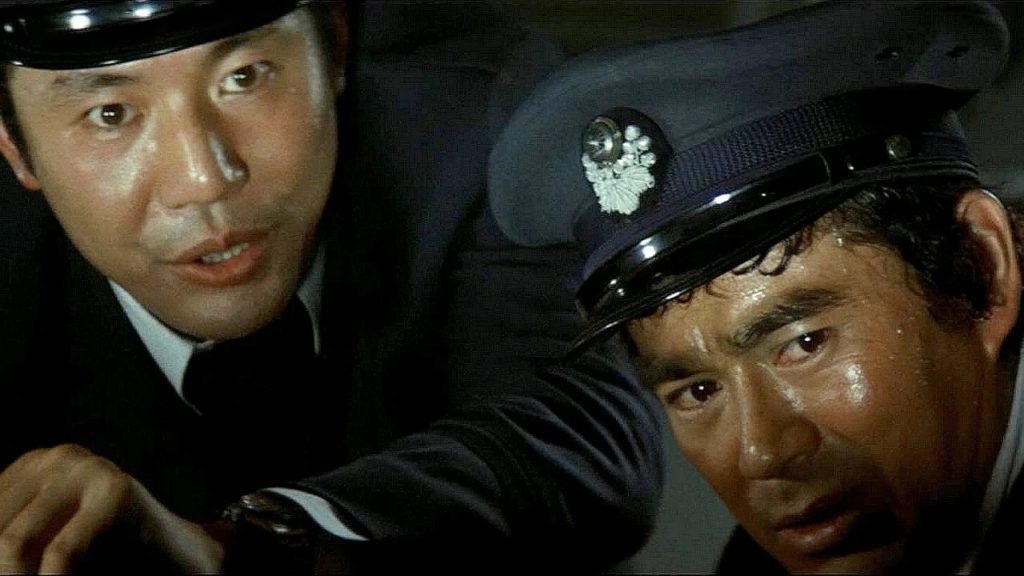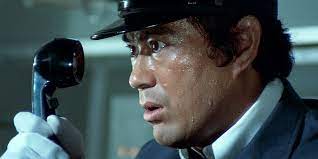The Bullet Train
June 1, 2023 · 1 comment
By Tom Wilmot.

There’s a bomb on the Hikari 109! Tetsuo Okita (Ken Takakura) and his band of blue-collar bombers attempt to extort money from the government, holding the lives of some 1,500 bullet train passengers to ransom. When the National Railway suggests stopping the train to check for an explosive, they learn that the bomb will detonate if the vehicle slows to less than 80 km/h. As Okita negotiates with the powers that be, rail controller Kuramochi (Ken Utsui) and engineer Aoki (Sonny Chiba) keep the train and its passengers hurtling towards an unnervingly uncertain fate.
No, this is not the 2022 Brad Pitt vehicle with a similar sounding name. If the surface-level narrative for The Bullet Train sounds familiar, it’s because it bears a close resemblance (which screenwriter Graham Yost insists was inadvertent) to the 1994 Keanu Reeves vehicle Speed. For a supposed suspense thriller, a runtime of two and half hours raises eyebrows, yet director Junya Sato manages to sustain tension through several intense set-pieces. A near miss between passing trains, a ransom drop-off gone awry, and the eventual handling of the bomb itself all result in nail-biting sequences. Some of the more spectacular scenes are brought to life through the shrewd use of miniatures; these special effects are noticeable but hold up surprisingly well thanks to Sato’s clever framing and camera placement. Few modern Hollywood blockbusters are filled with such a variety of suspenseful sequences, so the film remains an engaging thriller right up until its final moments.

One of The Bullet Train’s most appealing qualities is its all-star cast. Toei loaded the film with as many of its contracted stars as possible, some of whom only appear in blink-and-you’ll-miss-it cameos – Sister Street Fighter’s (1974) Etsuko Shihomi is one such figure, popping up as a telephone operator early on. Of the film’s three leading actors, Sonny Chiba is likely to be the most recognisable to Western audiences, yet he features in an unusually passive role here. The ass-kicking hard nut of The Street Fighter trilogy, released a year before The Bullet Train, is nowhere to be found, as Chiba stars as a profusely sweating train engineer, Aoki, who’s left powerless at the controls of the seemingly unstoppable train. Starring as Chiba’s superior, and serving as the film’s moral centre, is Ken Utsui as Kuramochi. Perfectly suited to the role of affable and dutiful rail controller, Utsui finds himself at odds with his higher-ups and is placed in surprisingly intense moral dilemmas, the strain of which eventually take their toll.
The real star of The Bullet Train, who never sets foot in a railway station for the entirety of the runtime, is Ken Takakura’s Okita. A far cry from the maniacal mad bomber that one might expect from such a film, Okita is an average Joe suffering from the sudden end to Japan’s post-war economic miracle. The character suits Takakura, best known prior to this for his appearances in Toei’s early yakuza films, where he frequently featured as an honour-bound gangster. Okita and his gang of would-be bombers aren’t moustache-twirling villains with a political agenda. Instead they are working stiffs trying to get one back on the system that’s failed them. Of course, these working-class anti-heroes are still willing to risk the lives of 1,500 commuters to get what they want, a fact that the film never shies away from or tries to defend, but they’re presented in a way that makes them understandable. Part of the reason for the long running time is that the narrative takes pains to explore the backstory of our bombers, each of whom is sympathetic to an extent. You’ll inevitably find yourself rooting for Okita to make an unlikely getaway as the film reaches the last of several climaxes.

Included in Eureka Entertainment’s new release of The Bullet Train is an English dubbed version of the successful international ‘Export’ cut, which shaves the runtime down to 115 minutes. If you’ve ever watched the film on UK streaming services, this is the version you will have seen. While the Export cut is certainly brisker in pace, adding somewhat to the narrative’s urgency, this comes at the expense of the backstories for our bombing crew. As such, you can’t help but feel that a vital dimension to the story and its characters is lost in the ‘Export’ cut, as there’s virtually no reason to sympathise with Okita and his conspirators.
Eureka’s package features a host of informative supplements, beginning with a feature-length commentary from Midnight Eye co-founders Tom Mes and Jasper Sharp. The pair have developed a habit of co-commentating in recent years, and their usual spritely back and forth is welcome here once again. Amongst other things, the Japanese cinema experts discuss the career of Ken Takakura, radical leftist protests in the 1960s, and the rise of the influential Kadokawa Pictures, all whilst name-dropping a variety of related films that are sure to pique the interest of cinephiles.
Perhaps the most enlightening supplement on Eureka’s release is a new interview with Junya Sato biographers Tasuya Masuto and Masaaki Nomura. The pair trace Sato’s career at Toei and touch on some of the key themes of his work, notably the plight of the individual versus the system. As well as dropping titbits about the film’s development and tight production schedule, which ultimately resulted in a muddled marketing campaign, the biographers share the tale of an undercover European actor who slyly took pictures of a bullet train control room for Toei after the Japan Rail refused to cooperate on production – something about the title “Shinkansen Big Explosion” didn’t sit right with the organisation. Complementing this feature is an archival interview with Junya Sato himself, during which the director discusses working with Toei and comments on the then-current state of Japanese cinema.

Film scholars Tony Rayns and Kim Newman offer their two cents on The Bullet Train, the former providing some background on Toei as a male-centric studio. Genre film expert Newman guides us through an enjoyable history of mad bombers in cinema, taking us from Alfred Hitchcock’s Sabotage (1936) to Richard Lester’s Juggernaut (1974). Rounding out Eureka’s impressive slate of extras is a booklet featuring a new essay from author Barry Forshaw, who provides an overview of both Takakura’s and Chiba’s careers during the 1970s, along with exploring the genre specialities of the major Japanese studios – Toei and Nikkatsu fought it out over yakuza flicks, while Shochiku was famed for its melodramas.
As consumers, we’ve been spoiled in recent years with the sheer amount of excellent underground, classic, and arthouse Japanese cinema that has been made available on UK home media. However, once in a while, a good, old-fashioned, all-star blockbuster is required, and The Bullet Train fits the bill perfectly. Eureka have pulled out all the stops along the proverbial bullet train line to do justice to this mostly forgotten blockbuster. We can only hope that more Japanese epics receive similar treatment on their way to the small screen.
The Bullet Train is released in the UK by Eureka.
Ian Raymond
June 1, 2023 8:06 pm
I remember reading the book (1980??) but had never been able to see the film - this will definitely be on the shopping list. I also thought when Speed came out: 'Hang on, did they get this idea from Bullet Train...?' (BTW, Juggernaut is probably one of the less well known 'bomber' films, which belies the sheer quality of its script and acting - including an outstanding character performance by the late Richard Harris.)